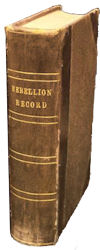
—Lieut. Slemmer, late in command of Fort Pickens, had a handsome reception at Independence Hall, Philadelphia. A military procession, consisting of Col. Small’s Regiment of ten companies, preceded by a drum corps and a brass band, playing Hail Columbia, escorted the Lieutenant and his aged father-in-law from the Continental Hotel to the Hall, where Mayor Henry addressed him in behalf of the Councils and people of the city in happy terms, saying, among other things: “It is for that firm maintenance of the Constitution and its laws that your fellow-citizens have assembled this day. to greet you with their applause and admiration. It is in support of that Constitution that Philadelphia has sent her sons by thousands to the tented field, and will, if the necessity arises, pour forth hosts of brave and willing men to battle in this great cause. Permit me to express the sincere wishes of your fellow-citizens for the restoration of that health which has been materially impaired by your arduous services, and with it to convey the assurance that they will regard with interest each new laurel that will adorn your future career.”
To this Lieut. Slemmer replied: “Mr. Mayor and Councils of Philadelphia, I thank you very heartily for your expression of esteem and approval. When I stood almost alone, with a handful of men on Santa Rosa Island, it was the thought of just such sympathy as you have here expressed which made the performance of that duty a more welcome task. Enemies were around us, but we felt that we were not alone; for we knew that the whole North in heart, soul, and prayers was with us. Gentlemen, I would like to have seen the end of that little piece of work before coming among you; but having waited patiently for four long months, my men, who so nobly stood around me in darkness and peril, having become diseased through confinement and want of proper food, I concluded that the best thing for them and the country would be to bring them North where they might recruit their strength so as to enter again those stirring scenes where soon every soldier will be needed.”—National Intelligencer, June 15.
—In the Maryland Legislature in session at Frederick, Mr. McKaig presented a report from the Commissioners appointed by the Legislature to visit Montgomery. Accompanying this was a paper from Jefferson Davis expressing his gratification to hear that the State of Maryland was enlisted on the side of peace and reconciliation, and avowing his perfect willingness for a cessation of hostilities, and a readiness to receive any proposition for peace from the United States Government.—(Doc. 246.)
—Colonel Wallace, with the Indiana regiment, proceeded from Cumberland, Md., about forty miles into Virginia, to a place called Romney, where he surprised a body of about five hundred armed rebels. They showed fight, and a brisk little battle followed, resulting in the rout of the rebels. Colonel Wallace pursued them, killing two, and wounding one of them sure, as that number was left on the field. Some of the killed and wounded among the rebels were conveyed away in the flight. Only one of Colonel Wallace’s men was wounded, none killed. The Indiana boys seized a considerable amount of arms, ammunition, some horses, and provisions. Colonel Wallace then returned with his force to Cumberland, instead of holding Romney, which is on the route towards Harper’s Ferry, and about fifty miles from the latter place.—Baltimore American, June 14.


